Water Educator Network Member Feature – December 2019
 Name and Position: Bethany Howell, Executive Director
Name and Position: Bethany Howell, Executive Director
Organization: Rio Grande Watershed Conservation & Education Initiative (RGWCEI)
Became a WEN Member: December 2016
Watershed: Rio Grande
Favorite River in CO: Rio Grande
Favorite Water-Based Activity: Rafting, canoeing, or kayaking.
Our Favorite Quote from Bethany:
“When we have the opportunity to be part of a wider conversation, especially those of us in education, we have an obligation to be as cognizant as possible of how water is addressed throughout the state. Being a member of WEN is taking that opportunity and using it for the benefit of our basins and for Colorado.”
Interview with Bethany:
Where are you from? I was born in Hugo, Colorado, but moved back to Texas where my parents are from when I was 2. I grew up in Marble Falls, TX on my family’s heritage ranch near Austin.
What are the primary duties of your current job? Creating and teaching programs with kids in all six counties of the San Luis Valley on watershed issues. We primarily focus on how natural resources intersect with agriculture, so main topics revolve around water and soil health. I also manage our volunteer staff and accountant, as well as grant writing, fundraising, all the fun parts of running a small non-profit.
What are your main areas of expertise? My background is in communications and public relations, mostly in higher education and then in non-profits. My degrees are both in English, which has been wonderful in helping communicate our mission and even with creating and teaching activities. I taught college classes in graduate school, but didn’t teach K-12 until working with RGWCEI.
Describe the coolest project that you’re currently working on.
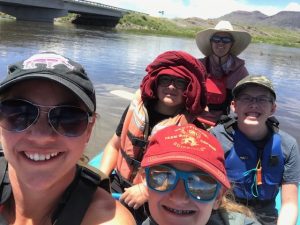 All our projects are pretty cool in different ways. We are lucky to have a diversity of ages, partners, and places to work with, so each program has a distinct vibe. I’m really excited about planning the second year of our Teen Outdoor Stewardship Camp in partnership with Adams State University’s Adventure Programs. We tried out the pilot program last summer with 9 teens from around the San Luis Valley, and it was so much fun. We didn’t have a local program for teens that focused on the same natural resource topics as our other camp for the younger kids, so we worked together last year to address that gap.
All our projects are pretty cool in different ways. We are lucky to have a diversity of ages, partners, and places to work with, so each program has a distinct vibe. I’m really excited about planning the second year of our Teen Outdoor Stewardship Camp in partnership with Adams State University’s Adventure Programs. We tried out the pilot program last summer with 9 teens from around the San Luis Valley, and it was so much fun. We didn’t have a local program for teens that focused on the same natural resource topics as our other camp for the younger kids, so we worked together last year to address that gap.
We focused on water, which was fortunate since we had an amazing snow pack that resulted in really high flows on the Rio Grande in 2019. The teens were introduced to our watershed through recreation activities facilitated by Adams State college staff, and through those activities (rafting, hiking, stand up paddleboards, camping), they also learned about the ways water impacts our watershed. We spent all week exploring up and down the Rio Grande. Rafting down the Rio Grande near the New Mexico state line introduced them to the Rio Grande Compact since we took out at the streamflow gauge near Lobatos Bridge. We finished the week whitewater rafting near the headwaters in Creede and hiked near the Rio Grande Reservoir to talk about water storage and the national forest’s role in water quality. It was an amazing week and we are eager to try it again in summer 2020.
How long have you been a Describe the coolest project that you’re currently working on. Since December 2016.
What made you want to become involved in the Water Educator Network? I’m interested in learning about how water is addressed in all parts of Colorado. Since I’m new(ish) to the state (since 2013), I knew I had a lot of catching up to do. Learning from other areas helps me to be the best educator in our own basin, especially since kids are really interested in how water is used everywhere. I know that we have different issues to focus on that urba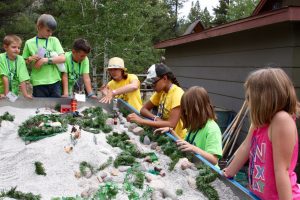 n areas don’t necessarily think about often (agriculture, wetlands, wildlife corridors), but I think all the conversations happening right now intersect with each other on some level. Being part of the WEN gives me an opportunity to stay in the conversation, even though we are geographically pretty far from other basins.
n areas don’t necessarily think about often (agriculture, wetlands, wildlife corridors), but I think all the conversations happening right now intersect with each other on some level. Being part of the WEN gives me an opportunity to stay in the conversation, even though we are geographically pretty far from other basins.
What does being a Water Educator Network member mean to you? When we have the opportunity to be part of a wider conversation, especially those of us in education, we have an obligation to be as cognizant as possible of how water is addressed throughout the state. Being a member of WEN is taking that opportunity and using it for the benefit of our basins and for Colorado.
What is your favorite Water Education Colorado workshop or event that you’ve attended? I haven’t had the chance to attend as many as I’d like, but I did go to a Storm Water Quality one in Durango that I’m still thinking about 3 years later. I am just amazed at the strides some communities have made to address stormwater issues, and at the same time I know that we still have a long way to go.”
What was your involvement in the development of the Statewide Water Education Action Plan (SWEAP)? I had the honor of representing the Rio Grande Basin on the Coalition. I attended the all-day planning meeting in Keystone in April, which was a cool brain trust to be part of, and pretty humbling.
How do you plan to use the Statewide Water Education Action Plan (SWEAP)? I think the broad core focus topics are extremely relevant to all the basins, and I’m happy that we will be able to implement in ways that make sense for our individual basins. There are definite areas for improvement in our education across the state, and SWEAP is a necessary step to addressing how we as a state feel about water – our values and our ethics in using it.
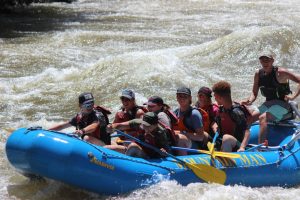
Describe your proudest water-related accomplishment? Personally, I took a whitewater kayak course a few years ago and made it through some Class III rapids without flipping. Professionally, it is being part of the Roundtable as their PEPO (Public Engagement, Participation, and Outreach) liaison and using my past experience in communications on its behalf.
What is your advice for an educator who is brand new to water education in Colorado? Water is a deep and complex topic in Colorado, so there’s no way to feel that you ever have it completely covered. I learned more by sitting in as many water meetings as I could and just listening to what people were concerned about. I have attended water conservation district meetings, agency meetings with CPW and the Forest Service, soil & water conservation district meetings, and all of them taught me really valuable lessons about what’s important to our farmers, community members, and land management professionals.
What is your favorite river in Colorado? That’s a funny question: of course it’s the Rio Grande! I live on a tributary creek above Del Norte so my kids are constantly playing in it. My husband teaches outdoor recreation at the university, so we’re on it in all the seasons. It’s one of the longest rivers in North America, so it might not have the volume of the Colorado, but it impacts a heck of a lot of land.
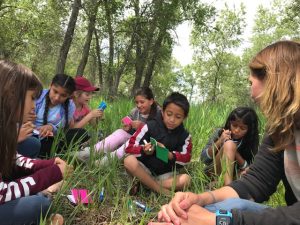 What is your favorite water-based activity? I love rafting, canoeing, or kayaking. I grew up near a lake, so playing in the currents and actually going somewhere on the water is relaxing and exciting all at the same time.
What is your favorite water-based activity? I love rafting, canoeing, or kayaking. I grew up near a lake, so playing in the currents and actually going somewhere on the water is relaxing and exciting all at the same time.
What else do you do in your free time? Did I mention I have two kids? I watch their sports activities and serve as chauffeur for most of my free time. But I also love to go running with my Siberian husky, Mischa and am training for my third half marathon. When I can squeeze in a few chapters before bed, I love to read history, historical fiction, or young adult dystopian novels.
What is your biggest goal for the next year, professional or otherwise? I would love to increase the capacity of RGWCEI so that we have another full time staff member to help with programs. There’s definitely a need and space for more programs or expanding current programs, we just don’t have enough hands and brains to get it all done. I’m also interested in creating more communication vehicles to give accurate information about water issues to our community. Now that we’re facing a potential water export plan again, our Basin has some difficulties to address and misinformation is worse than no information.

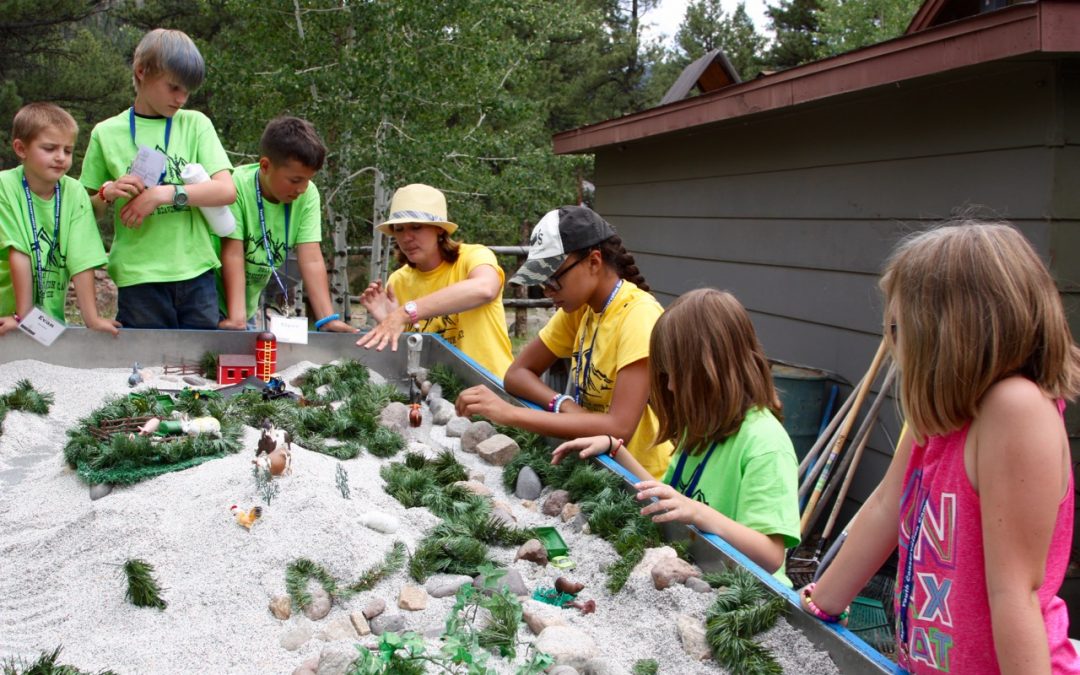
 Print
Print